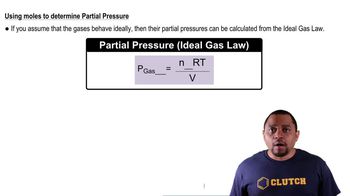Textbook Question
The value of Kc for the reaction of acetic acid with ethanol is 3.4 at 25°C:CH3CO2H1soln2 + CH3CH2OH1soln2 ∆Acetic acid Ethanol CH3CO2CH2CH31soln2 + H2O1soln2 Kc = 3.4 (a) How many moles of ethyl acetate are present in an equi- librium mixture that contains 4.0 mol of acetic acid,6.0 mol of ethanol, and 12.0 mol of water at 25 °C?





